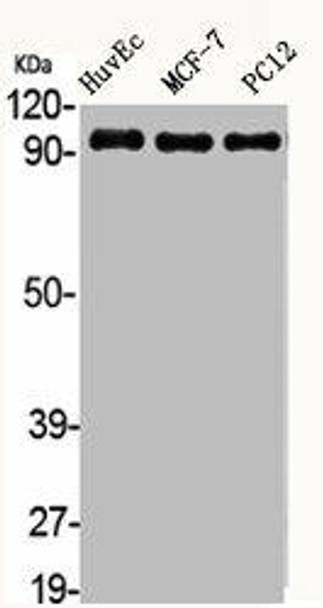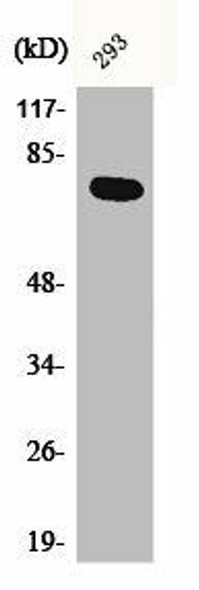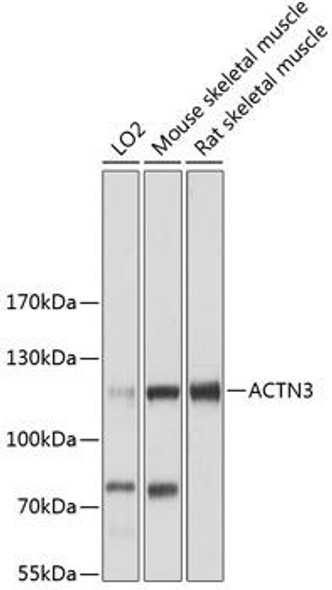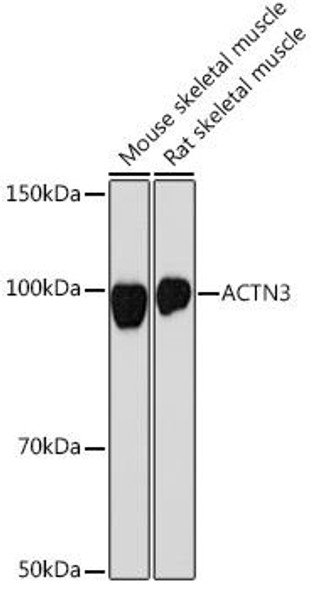ACTN2/ACTN3 Antibody (PACO06231)
- SKU:
- PACO06231
- Product Type:
- Antibody
- Reactivity:
- Human
- Mouse
- Rat
- Host Species:
- Rabbit
- Isotype:
- IgG
- Applications:
- ELISA
- WB
- IHC
- IF
- Antibody Type:
- Polyclonal Antibody
- Conjugation:
- Unconjugated
Description
ACTN2/ACTN3 Antibody (PACO06231)
The ACTN2/ACTN3 Polyclonal Antibody (PACO06231) is a valuable tool for researchers studying the ACTN2 and ACTN3 proteins, which are important for muscle function and athletic performance. This antibody, produced in rabbits, is highly specific for human samples and has been validated for use in Western blot applications. By binding to these proteins, the antibody allows for the detection and analysis of ACTN2 and ACTN3 in various cell types, making it ideal for studies in muscle biology and exercise physiology.ACTN2 and ACTN3 are actin-binding proteins that are predominantly expressed in skeletal muscle. They play a crucial role in muscle contraction and force production, making them key targets for research into muscle development, function, and performance.
Studies have shown that variations in the ACTN3 gene can impact athletic performance and muscle strength, making it a focus of interest in sports science and genetics research.Understanding the role of ACTN2 and ACTN3 in muscle physiology can provide valuable insights into muscle-related disorders, such as muscular dystrophy and muscle atrophy, as well as potential strategies for improving athletic performance and physical fitness. The ACTN2/ACTN3 Polyclonal Antibody is a valuable tool for researchers interested in exploring the functions and pathways associated with these important muscle proteins.
| Antibody Name: | ACTN2/ACTN3 Antibody (PACO06231) |
| Antibody SKU: | PACO06231 |
| Size: | 50ug |
| Host Species: | Rabbit |
| Tested Applications: | ELISA, WB, IHC, IF |
| Recommended Dilutions: | ELISA:1:20000, WB:1:500-1:2000, IHC:1:100-1:300, IF:1:200-1:1000 |
| Species Reactivity: | Human, Mouse, Rat |
| Immunogen: | Synthesized peptide derived from the N-terminal region of human Actinin- α 2/3. |
| Form: | Liquid |
| Storage Buffer: | Liquid in PBS containing 50% glycerol, 0.5% BSA and 0.02% sodium azide. |
| Purification Method: | The antibody was affinity-purified from rabbit antiserum by affinity-chromatography using epitope-specific immunogen. |
| Clonality: | Polyclonal |
| Isotype: | IgG |
| Conjugate: | Non-conjugated |
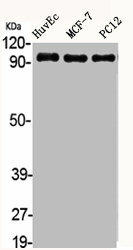 | Western Blot analysis of HuvEc MCF7 PC12 cells using Actinin- alpha 2/3 Polyclonal Antibody. |
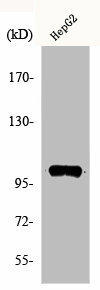 | Western Blot analysis of HuvEc cells using Actinin-alpha 2/3 Polyclonal Antibody. |
| Synonyms: | ACTN2; α-actinin-2; α-actinin skeletal muscle isoform 2; F-actin cross-linking protein; ACTN3; α-actinin-3; α-actinin skeletal muscle isoform 3; F-actin cross-linking protein |
| UniProt Protein Function: | ACTN2: F-actin cross-linking protein which is thought to anchor actin to a variety of intracellular structures. This is a bundling protein. Defects in ACTN2 are the cause of cardiomyopathy dilated type 1AA (CMD1AA). Dilated cardiomyopathy is a disorder characterized by ventricular dilation and impaired systolic function, resulting in congestive heart failure and arrhythmia. Patients are at risk of premature death. Belongs to the alpha-actinin family. |
| UniProt Protein Details: | Protein type:Motility/polarity/chemotaxis; Cytoskeletal Chromosomal Location of Human Ortholog: 1q42-q43 Cellular Component: cortical actin cytoskeleton; cytoskeleton; focal adhesion; extracellular region; dendritic spine; actin filament; pseudopodium; Z disc; cytosol; filopodium Molecular Function:actin filament binding; protein dimerization activity; integrin binding; identical protein binding; protein binding; LIM domain binding; structural constituent of muscle; cytoskeletal protein binding; titin binding; calcium ion binding; FATZ binding; thyroid hormone receptor coactivator activity Biological Process: focal adhesion formation; platelet activation; negative regulation of potassium ion transport; positive regulation of potassium ion transport; muscle filament sliding; protein homotetramerization; regulation of apoptosis; synaptic transmission; regulation of membrane potential; platelet degranulation; microspike biogenesis; blood coagulation; cell adhesion Disease: Cardiomyopathy, Dilated, 1aa |
| NCBI Summary: | Alpha actinins belong to the spectrin gene superfamily which represents a diverse group of cytoskeletal proteins, including the alpha and beta spectrins and dystrophins. Alpha actinin is an actin-binding protein with multiple roles in different cell types. In nonmuscle cells, the cytoskeletal isoform is found along microfilament bundles and adherens-type junctions, where it is involved in binding actin to the membrane. In contrast, skeletal, cardiac, and smooth muscle isoforms are localized to the Z-disc and analogous dense bodies, where they help anchor the myofibrillar actin filaments. This gene encodes a muscle-specific, alpha actinin isoform that is expressed in both skeletal and cardiac muscles. Several transcript variants encoding different isoforms have been found for this gene. [provided by RefSeq, May 2013] |
| UniProt Code: | P35609 |
| NCBI GenInfo Identifier: | 543742 |
| NCBI Gene ID: | 88 |
| NCBI Accession: | P35609.1 |
| UniProt Secondary Accession: | P35609,Q86TF4, Q86TI8, B1ANE4, B2RCS5, |
| UniProt Related Accession: | P35609 |
| Molecular Weight: | 103,920 Da |
| NCBI Full Name: | Alpha-actinin-2 |
| NCBI Synonym Full Names: | actinin, alpha 2 |
| NCBI Official Symbol: | ACTN2 |
| NCBI Official Synonym Symbols: | CMD1AA |
| NCBI Protein Information: | alpha-actinin-2; F-actin cross-linking protein; alpha-actinin skeletal muscle |
| UniProt Protein Name: | Alpha-actinin-2 |
| UniProt Synonym Protein Names: | Alpha-actinin skeletal muscle isoform 2; F-actin cross-linking protein |
| Protein Family: | Alpha-actinin |
| UniProt Gene Name: | ACTN2 |
| UniProt Entry Name: | ACTN2_HUMAN |

